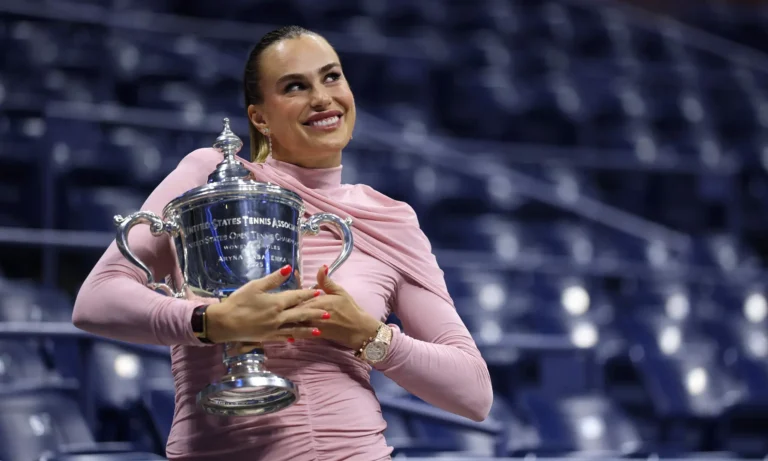Aryna Sabalenka underlined her dominance at the top of women’s tennis by defending her US Open crown with a straight-sets victory over Amanda Anisimova in Saturday’s final. The Belarusian, ranked world number one, delivered a ruthless performance to claim a 6-3, 7-6 (7/3) win inside Arthur Ashe Stadium, sealing the fourth Grand Slam title of her career and solidifying her place among the sport’s elite. For Sabalenka, this triumph came as redemption after suffering heartbreak in both the Australian and French Open finals earlier in the year. Learning from those setbacks, she produced her sharpest tennis on the biggest stage, attacking Anisimova’s inconsistent serve and holding her nerve in key moments. Her victory also makes her the first woman to defend the US Open since Serena Williams in 2014. Sabalenka admitted the win felt particularly sweet after enduring such tough losses earlier in the season, calling it a reward for all the hard lessons.
Also Read: Sabalenka Sets Up US Open Final with Anisimova After Beating Pegula
Anisimova, who had previously won six of nine encounters against Sabalenka, entered the match with confidence and early momentum. She broke Sabalenka’s serve twice in the opening set and at one stage led 3-2. But errors on serve, including costly double faults, allowed the defending champion to seize back control. Sabalenka pounced on every opportunity, converting five of her six break points compared to Anisimova’s struggles in capitalizing on her own chances. The American, who was playing in her second Grand Slam final after finishing runner-up at Wimbledon, admitted afterward that nerves played a role in her performance. She said the closed roof on Arthur Ashe made visibility difficult during her serve, adding to her frustrations. Despite moments of brilliance with her powerful groundstrokes, she could not maintain the consistency needed to push Sabalenka into deeper trouble.
The second set brought more drama as Anisimova briefly fought back, breaking to level at 3-3. But Sabalenka once again responded with relentless aggression, breaking for a 5-3 lead and moving within striking distance of victory. Serving for the championship at 5-4, Sabalenka faltered with a missed smash, handing Anisimova a lifeline to extend the contest. Yet when it mattered most, Sabalenka’s calm and experience shone through. In the tiebreak, she raced to a commanding 6-1 lead before closing the match with her trademark power and precision, clinching her 19th consecutive tiebreak win in the process.
For Anisimova, the loss was a bitter pill to swallow. She admitted she didn’t “fight hard enough” and once again felt nerves overwhelm her in a major final, just as they did during her Wimbledon loss to Iga Swiatek earlier this summer. While she showed glimpses of her immense talent, she conceded that her lack of aggression and composure cost her the match. Still, she expressed determination to keep working toward her dream of lifting a Grand Slam trophy in the future.
Sabalenka’s victory was not only a testament to her talent but also to her resilience. Overcoming two devastating final defeats earlier in the year, she turned disappointment into fuel for success. Her ability to dominate in pressure situations, especially in tiebreaks, has become a hallmark of her game. With her fourth major now secured and her world number one ranking firmly intact, Sabalenka has established herself as the player to beat on the women’s tour. For Anisimova, the experience may sting, but it also provides another valuable lesson in her journey toward becoming a consistent contender. Saturday’s final ultimately showcased two contrasting stories: one of triumph built on resilience, and another of frustration shadowed by nerves. Yet it left no doubt that Sabalenka stands firmly at the pinnacle of the sport.


